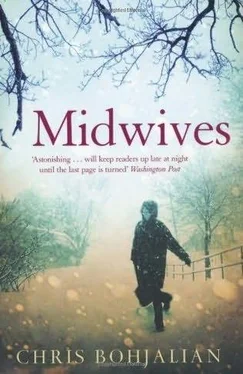Chris Bohjalian - Midwives
Здесь есть возможность читать онлайн «Chris Bohjalian - Midwives» весь текст электронной книги совершенно бесплатно (целиком полную версию без сокращений). В некоторых случаях можно слушать аудио, скачать через торрент в формате fb2 и присутствует краткое содержание. Жанр: Современная проза, на английском языке. Описание произведения, (предисловие) а так же отзывы посетителей доступны на портале библиотеки ЛибКат.
- Название:Midwives
- Автор:
- Жанр:
- Год:неизвестен
- ISBN:нет данных
- Рейтинг книги:5 / 5. Голосов: 1
-
Избранное:Добавить в избранное
- Отзывы:
-
Ваша оценка:
- 100
- 1
- 2
- 3
- 4
- 5
Midwives: краткое содержание, описание и аннотация
Предлагаем к чтению аннотацию, описание, краткое содержание или предисловие (зависит от того, что написал сам автор книги «Midwives»). Если вы не нашли необходимую информацию о книге — напишите в комментариях, мы постараемся отыскать её.
Midwives — читать онлайн бесплатно полную книгу (весь текст) целиком
Ниже представлен текст книги, разбитый по страницам. Система сохранения места последней прочитанной страницы, позволяет с удобством читать онлайн бесплатно книгу «Midwives», без необходимости каждый раз заново искать на чём Вы остановились. Поставьте закладку, и сможете в любой момент перейти на страницу, на которой закончили чтение.
Интервал:
Закладка:
That's one of the main reasons that my mother became a lay midwife instead of a medically trained nurse midwife or perhaps even an obstetrician-gynecologist: no college degree and-over time-the conclusion that she didn't need one.
Of course, she also believed with a passion that in most cases women should have their babies at home. She thought it was healthier for both the mother and the newborn. Women, in her mind, labored most efficiently in the environment they knew best and that made them the most comfortable; likewise, it was important to greet a baby as it emerged into the world in a room that was warm, and to catch it with hands that were kind. The whole idea of salad server-like forceps and abdominal transducers irritated my mother, and-eventually, this would prove to be the cruelest irony of all-she would give a laboring woman every chance in the world to deliver vaginally. In some cases, she waited for days, always patiently, before she would take the woman to a hospital where a doctor would anesthetize her, then cut through her abdominal and uterine walls and lift the startled child into the fluorescent lights of an operating room.
My mother knew home birth wasn't for everyone, but she wanted it to remain a viable option for those who were interested. And if she had ever become a doctor or nurse-midwife, the state's Board of Medical Practice would have tried to force her to practice in a hospital.
That was how the regulations worked then; that's how they work now. If doctors and nurse-midwives deliver babies at home, they do so without malpractice insurance or state sanction. So from my mother's perspective, there was no reason to get any sort of medical degree. She knew what she was doing.
Did Sibyl Danforth dislike hospitals and what her prosecutors would describe as the medical establishment? For a time, I think she did. Was she, as they called her, a renegade? You bet. (Although when accused of being a renegade in court, she smiled and said, "I prefer to think of myself as a pioneer." Whenever I come across that exchange in the piles of court papers I've amassed, I grin.)
There was a certain humor to her anti-ob-gyn bias that never came out at the trial. In one photo of her taken in 1969, she's leaning against the back of a VW Beetle, and there by her knees are two bumper stickers: QUESTION AUTHORITY! and ONLY DUCKS SHOULD BE QUACKS. The same misgivings that she had for what she perceived to be the entrenched power of professors and college presidents, she had for physicians and hospital administrators as well.
And while she largely got over her distrust of doctors-while she never dawdled when she decided a woman needed medical intervention, while she certainly took me to pediatricians when I wasn't feeling well as a child-most doctors never learned to trust her.
…
Mine was not the first birth at which my mother was present. Mine was the third.
In the year and a half between her return from Boston and my arrival in Vermont, two other women in that circle of friends northeast of Montpelier had children, and my mother was present at the first birth by accident, and the second by choice. Appropriately, the first of those births was in a bedroom in a drafty old Vermont farmhouse, not a sterile delivery room in a hospital.
The first of those births-and my mother's baptism to midwifery-was Abigail Joy Wakefield's.
The little girl was supposed to have been born in a hospital, but she arrived two weeks early. The six adults who were present the night her mother's labor began, including the two people who would become my own parents, feared they were too stoned to try and drive any of the cars that were parked willy-nilly by the old house as though an earthquake had hit. Consequently, in a reversion to sex roles that in my opinion was part instinct, part socialized, the men agreed to run the three and a half miles up the road to the pay phone at the general store, where they could call an ambulance, and the women took the laboring mother upstairs to make her as comfortable as possible-and deliver the baby, if it came to that.
Why all three men went, including my father, has become another one of those almost mythic stories that were told and retold among my parents' friends for years. My father insisted that it was a spontaneous decision triggered by the fact that all of the men had dropped acid and simply failed to think the decision through properly. My mother and her female friends always teased him, however, that each guy had been a typical male who had wanted to get as far away from a woman in labor as humanly possible. Indeed, after traveling well over three miles in the dark, the men decided to wait by the main road for the ambulance, so they could be sure it found its way to the house.
Fortunately, neither my mother nor Abigail Joy's mother, Alexis Bell Wakefield, were tripping. That evening they'd merely been smoking pot.
Initially, my mother and Alexis were joined in the bedroom by Luna Raskin. Unlike the other two women, Luna did have all sorts of synthetic chemicals in her body, and every time Alexis sobbed, "Oh, God, it hurts, it hurts so much!" Luna would grab my mother's shirt and wail, "They're killing her, they're killing her!"
For a moment my mother assumed Luna meant Alexis's contractions. But when she elaborated, my mother realized with a combination of horror and astonishment that Luna was referring to President Lyndon Johnson and Secretary of State Dean Rusk, whose photograph had been on the front page of the newspaper that day.
At that point my mother threw Luna out of the bedroom and delivered the baby herself.
My mother wasn't sure what delivery tools she would need, and made one of those decisions that suggested she was indeed called to be a midwife: She concluded that women had been having babies for a long, long time before someone invented delivery tools, whatever they were. She imagined the female body had a pretty good idea of what it was supposed to do, if she could simply keep Alexis calm.
Nevertheless, she did round up all of the washcloths and towels she could find, and she filled a huge lobster pot with boiling hot water. She had no idea what one should expect from a placenta, she had no comprehension of what it meant to push, and (in hind-sight this probably was for the best) she had never even heard a term like cephalo-pelvic disproportion-an infant head a couple of hat sizes too big for mom's pelvis.
She turned off the overhead light in the bedroom, assuming Alexis would be more comfortable if she wasn't staring straight up into a bright light; the lamp in the corner shed just enough light for Sibyl to see clearly all of the things she didn't understand.
Fortunately, Alexis's own mother had insisted that her daughter visit an ob-gyn, and Alexis had done some reading on her own. The woman was also blessed with a very short labor and a small-but healthy-baby. Yet no labor is easy, and while my mother never lost her belief that the process she was watching was incredibly beautiful, as the pain Alexis was feeling grew worse, Sibyl grew fearful that something was wrong. She would rub Alexis's legs and massage her back, and purr that she thought Alexis was merely experiencing what almost every woman since creation had felt. But inside, my mother had her doubts.
When the better part of an hour had passed and neither the men nor an ambulance had returned, those fears led her to wash her hands once again, this time with a thoroughness that would have impressed a heart surgeon. She took off her silver bracelets and the three different rings she wore on her fingers, including the one my father had given her after a rock concert near Walden Pond, and scrubbed her wrists and her arms up to her elbows.
When her hands were as clean as she believed possible, she placed a finger as far inside Alexis's vagina as she could, hoping to discover whether the baby was about to emerge.
Читать дальшеИнтервал:
Закладка:
Похожие книги на «Midwives»
Представляем Вашему вниманию похожие книги на «Midwives» списком для выбора. Мы отобрали схожую по названию и смыслу литературу в надежде предоставить читателям больше вариантов отыскать новые, интересные, ещё непрочитанные произведения.
Обсуждение, отзывы о книге «Midwives» и просто собственные мнения читателей. Оставьте ваши комментарии, напишите, что Вы думаете о произведении, его смысле или главных героях. Укажите что конкретно понравилось, а что нет, и почему Вы так считаете.











